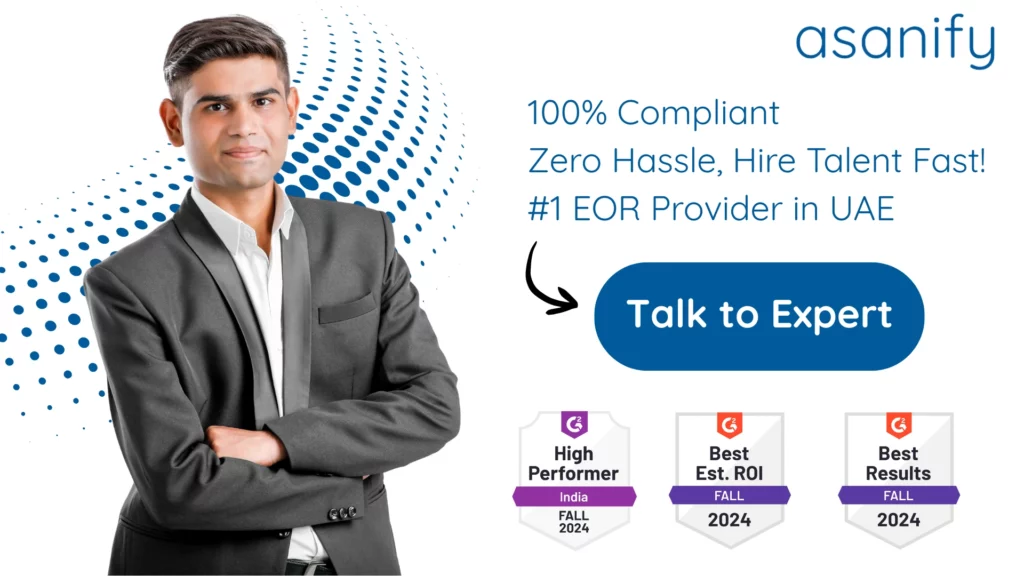Whether you’re a foreign employer hiring in the UAE or an employee working under a local contract, understanding the nuances of employee tax optimization is key to maximizing your take-home salary. While the UAE is known for its zero personal income tax, strategic structuring of compensation—especially under Employer of Record (EOR) models—can help enhance savings, comply with legal mandates, and unlock non-taxable benefits.
This guide explores compliant, high-impact ways to optimize employee compensation in the UAE for 2025.
Table of Contents
- Overview of Tax Optimization for Employees in UAE
- Tax Optimization Impact on Take-Home Salary
- Sample Salary Structuring in the UAE
- Gratuity and Statutory Benefits
- Fringe Benefits and Non-Taxable Perks
- Reliefs and Incentives for Families and Dependents
- Housing, Travel, and Allowance Planning
- Charitable Contributions and Zakat
- Common Exemptions and Income Planning Tips
- Conclusion
- FAQs
Overview of Tax Optimization for Employees in UAE
The UAE does not levy personal income tax on employment income, making it one of the most attractive jurisdictions for professionals. However, other forms of statutory contributions, mandatory benefits, and salary structuring play an important role in determining the net value of an employee’s compensation.
Key elements impacting take-home pay include:
- Gratuity (End-of-Service Benefit)
- Mandatory medical insurance
- Wage Protection System (WPS) compliance
- Emiratisation requirements (for certain roles)
Employers—especially those operating via an EOR—can legally structure compensation to offer tax-efficient benefits without violating UAE labor law.
Tax Optimization Impact on Take-Home Salary
Even in a zero-income-tax environment, optimizing take-home salary means minimizing deductions and maximizing non-taxable benefits. Some of the most effective strategies include:
- Structuring allowances for housing, transportation, and education as part of the salary
- Providing non-cash perks like insurance, relocation assistance, and annual flight tickets
- Ensuring full compliance with WPS, labor contract requirements, and visa rules to avoid fines or payroll delays
While there’s no tax on income, improperly structured salaries can reduce net value due to missed statutory benefits or compliance penalties.

Sample Salary Structuring in the UAE
Let’s consider an expatriate employee with a total monthly package of AED 20,000.
Scenario: Optimized Salary Breakdown
- Basic Salary (60%): AED 12,000
- Housing Allowance: AED 4,000
- Transport Allowance: AED 2,000
- Education Allowance: AED 1,500
- Medical Insurance: Provided directly by employer
- Annual Flight Allowance: AED 6,000/year (pro-rated monthly)
Suggested Read: Remote Employees Onboarding Checklist with EOR in UAE
Key Benefits of This Structure:
- Gratuity is calculated only on the basic salary, reducing long-term liability for employers while benefiting employees through high allowances.
- Allowances are typically non-taxable and WPS-compliant when part of the official labor contract.
- Medical insurance and travel offered as benefits enhance total compensation without affecting WPS filings.
Gratuity and Statutory Benefits
The UAE mandates end-of-service gratuity for all employees who complete one year or more of service. It’s calculated as:
- 21 days’ basic salary per year for the first five years
- 30 days’ basic salary per year after five years
Tax Optimization Tip: By legally reducing the portion of “basic salary” in the total compensation (minimum 60% threshold recommended), both the employer and employee can achieve long-term cost efficiency and increased take-home value.
Fringe Benefits and Non-Taxable Perks
Many UAE employers offer the following non-taxable, non-cash benefits:
- Medical and life insurance (mandatory in most Emirates)
- Housing and transport allowances
- Annual airfare reimbursements
- School fee allowances (for dependents)
- Joining/relocation bonus or shipping cost coverage
- Remote work stipends or flexible benefit credits
These benefits are not only WPS-compliant but are also fully tax-free, helping maximize net compensation value.

Reliefs and Incentives for Families and Dependents
While the UAE doesn’t offer personal tax reliefs like other jurisdictions, employers can structure packages to support families:
- Provide dependent visas for spouse and children
- Offer school fee allowances or subsidies
- Extend family health insurance plans
These incentives are particularly attractive to expatriate families and improve retention without increasing taxable salary (as income tax is 0%).
Housing, Travel, and Allowance Planning
Allowances form a crucial part of UAE salary optimization. Typical non-taxable allowances include:
- Housing: Usually 25–40% of gross pay
- Transportation: Fuel, car lease, or public transit allowance
- Education: Reimbursements for K–12 school tuition
- Travel: Annual home travel reimbursed by the employer
Structuring these properly in the labor contract ensures legal compliance and higher perceived value by employees.
Charitable Contributions and Zakat
Although charitable donations don’t qualify for tax deductions in the UAE (as there’s no income tax), employers often support local charities via corporate social responsibility (CSR) programs. These may be indirectly beneficial in strengthening brand image and employee satisfaction.
Some Muslim employees may voluntarily contribute Zakat, but it’s a religious obligation and not tied to the UAE tax system.

Common Exemptions and Income Planning Tips
While there are no “tax exemptions” in the traditional sense, UAE’s system allows for total income to remain untouched by tax. Still, employers and employees can take advantage of:
- Structured offer letters with benefits in-kind
- Relocation and housing support
- End-of-service gratuity planning
- Annual leave encashment structuring
- Avoiding salary components outside WPS
This ensures maximum take-home pay, retirement savings, and statutory compliance without unexpected legal exposure.
Suggested Read: Employer of Record UAE: A Comprehensive Guide 2025
Conclusion
Though the UAE doesn’t tax personal income, strategic salary structuring and smart use of non-monetary benefits can make a significant difference in employee financial outcomes. Whether you’re hiring through an Employer of Record (EOR) or managing payroll in-house, aligning with gratuity laws, WPS, and benefit schemes ensures both compliance and satisfaction. A well-optimized compensation plan not only enhances take-home pay but also strengthens employee retention and legal standing.
FAQs
No, there is no personal income tax on salaries in the UAE.
Yes, employees who serve at least one year are entitled to end-of-service gratuity.
No, these allowances are tax-free and considered part of WPS-compliant salary structuring.
It’s based on basic salary—21 days per year for the first five years, 30 days thereafter.
It’s a government-mandated electronic payroll system ensuring timely and accurate salary payments.
No, these are considered non-cash benefits and are not taxed.
Yes, structuring salary into base pay and allowances is common and legally compliant.
No, when structured as a company-provided benefit, it is non-taxable.
No, there is no income tax filing requirement for individuals.
Yes, many companies sponsor visas for an employee’s spouse and children.
It increases gratuity liability; a balanced split between base and allowances is more efficient.
No, performance bonuses are fully tax-free.
Yes, EORs like Asanify ensure salaries are structured legally and efficiently for both employer and employee.
No, encashed annual leave is not subject to income tax in the UAE.
No, the UAE does not tax foreign income or global assets of residents.
Not to be considered as tax, legal, financial or HR advice. Regulations change over time so please consult a lawyer, accountant or Labour Law expert for specific guidance.

